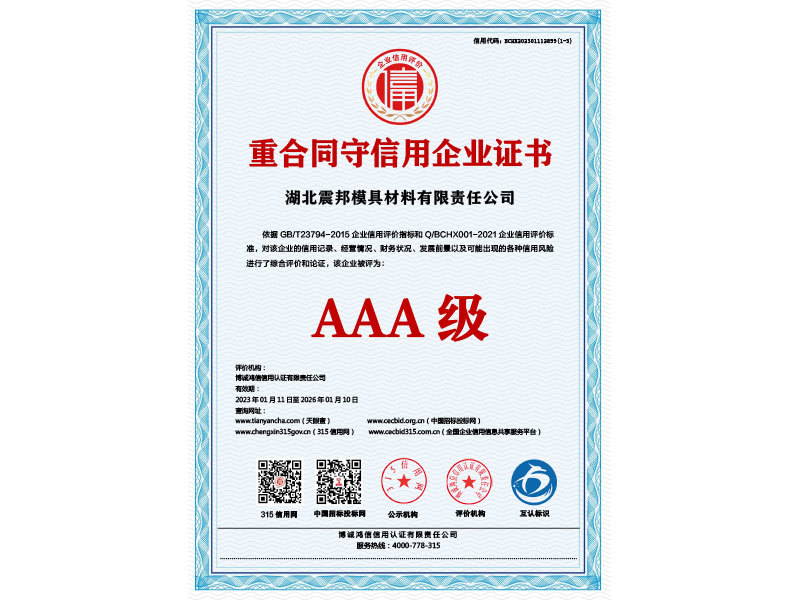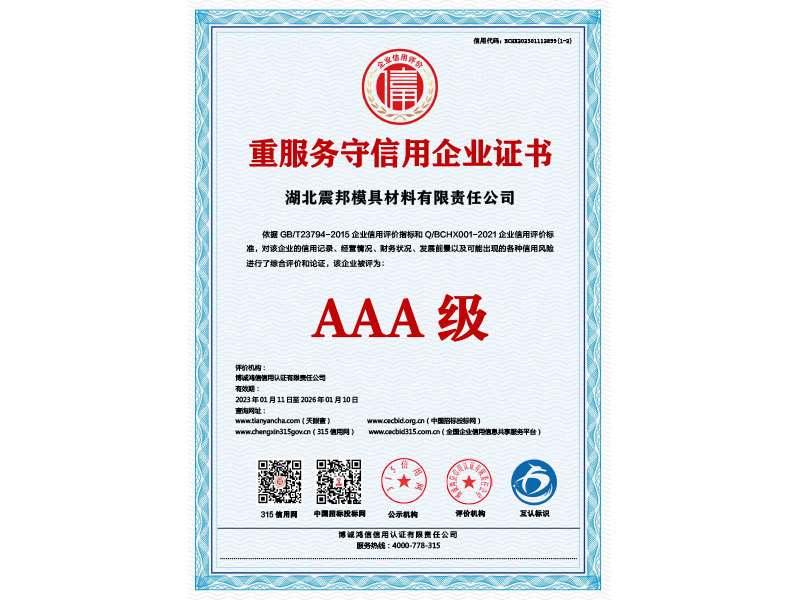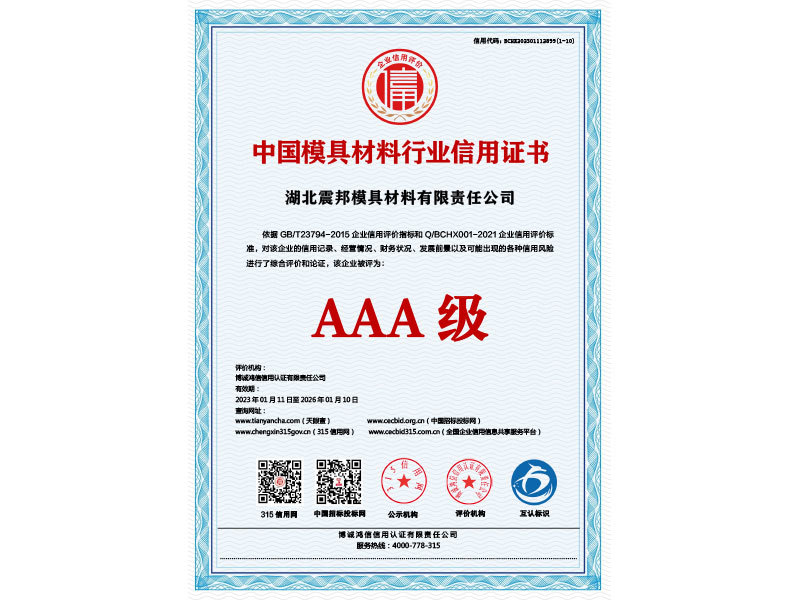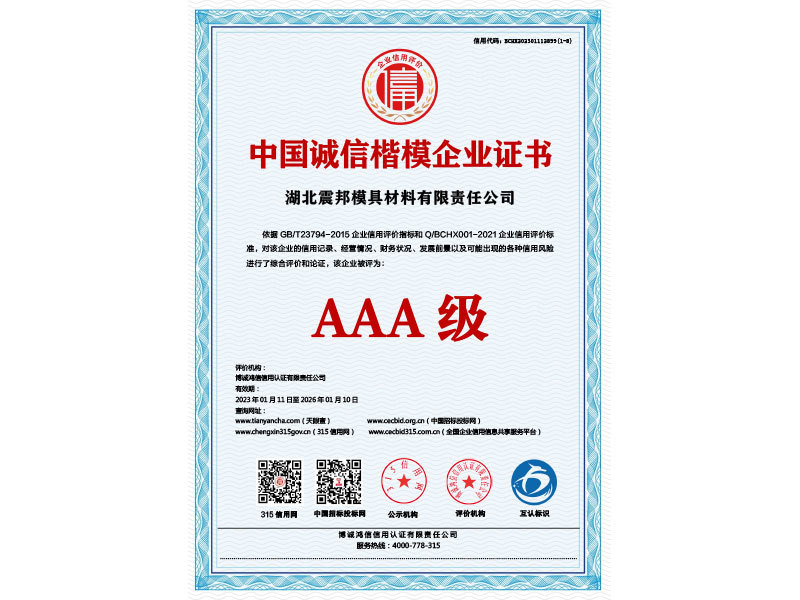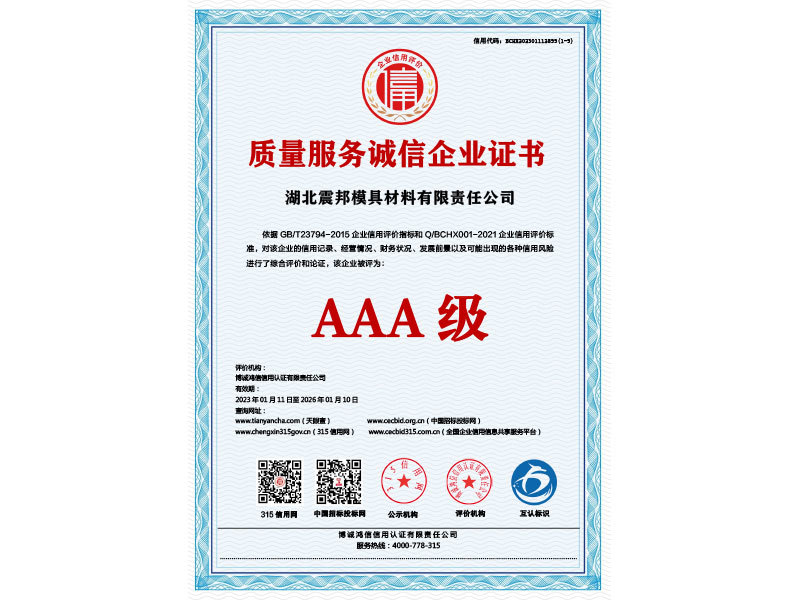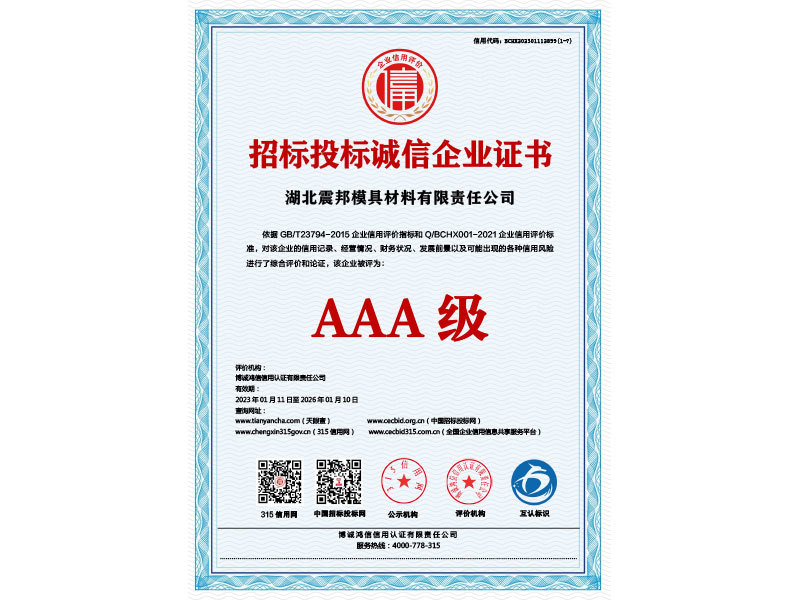Cr8Mo2VSi(DC53)
Category:
With the core advantages of "high wear resistance + high toughness + low deformation", Cr8Mo2VSi is an upgraded material to replace Cr12MoV/D2 steel. This steel belongs to high-carbon medium-chromium cold-work die steel, and its performance is comparable to that of Hitachi Metal SLD-8 or Datong DC53. It is an improved version of SKD11:
Contact:
Production Process









Details
Product information
Product model:Cr8Mo2VSi
Japan:DC53
Austria:K340
USA:A8
Sweden:ASSAB88
Product parameter
|
Steel grade(GB) |
Comparison of Steel Grades by Country | Technical Conditions | Chemical Constituents | ||||||||||||||
|
9Cr8Mo2VSi |
Japan(DC53) Austria(K340) USA(A8) Sweden(ASSAB88) |
Protocol |
C |
Cr |
Mo |
V |
S |
P |
Si |
Mn |
Ni |
W |
Al |
Cu |
Nb |
Co |
B |
|
0.90 ¦ 1.05 |
7.50 ¦ 8.50 |
1.80 ¦ 2.10 |
0.15 ¦ 0.35 |
≤0.025 |
≤0.030 |
0.80 ¦ 1.10 |
0.20 ¦ 0.50 |
≤0.25 |
|
|
≤0.25 |
|
|
|
|||
With the core advantages of "high wear resistance + high toughness + low deformation", Cr8Mo2VSi is an upgraded material to replace Cr12MoV/D2 steel. This steel belongs to high-carbon medium-chromium cold-work die steel, and its performance is comparable to that of Hitachi Metal SLD-8 or Datong DC53. It is an improved version of SKD11:
Smelting method
The core process is a combined process of electric arc furnace (EAF) primary smelting, ladle refining (LF) and vacuum degassing (VD);
Upgrading process: Electrostatic remelting (ESR) is added to high-end batches to significantly reduce inclusions (A/B/C ≤ 1.0 grade) and improve the uniformity and isotropic of the structure;
Process characteristics
Heat treatment process
|
Process |
Parameter |
Target effect |
|
annealing |
820~840℃slow cooling to 500℃then air cooling |
Hardness ≤230 HB,the carbide distribution is refined. |
|
quenching |
960~1040℃oil cooling(optimal 1020~1040℃) |
Hardness 62~65 HRC,fine grain martensite is obtained |
|
Tempering |
Tempering scheme 1:180 ~ 220 ℃ air cooling (low temperature); |
Hardness 60~63 HRC,secondary hardening is activated |
Key Innovations
The hardness after high temperature tempering is 1 ~ 2 HRC higher than that of D2 steel, and the combination of strength and toughness is better; The residual austenite is decomposed sufficiently, and the cryogenic treatment can be omitted;
Purity
Composition control (mass fraction%);
|
C |
Cr |
Mo |
V |
Si |
S/P |
|
0.90~1.10 |
7.50~8.50 |
1.80~2.00 |
0.20~0.50 |
0.80~1.20 |
≤0.025/≤0.020 |
Gas and inclusions: oxygen content ≤ 20 ppm (VD process), inclusions A/B/C ≤ 1.5 grade (after ESR optimization ≤ 1.0 grade);
Microstructure
Quenched and tempered state: matrix: tempered martensite (dominant) + a small amount of retained austenite;
Carbides: fine spherical Cr-Cr-C, VC and MC-MC eutectic carbides, with better distribution uniformity than D2 steel; Grain size: ≥ ASTM Grade 8, high temperature quenching promotes the dissolution of carbide and reduces the segregation of large carbide particles;
Impact work
Toughness performance: impact toughness at room temperature is significantly better than Cr12MoV (about 2 times) and D2 steel, and the combination of strength and toughness is better after high temperature tempering; The specific value is not disclosed, but the elongation is ≥ 14%, and the reduction of area is ≥ 22%;
Ultrasonic flaw detection
Standard: Industry General SEP 1921/ASTM A388;
Grade: defect ≤ Φ1 mm equivalent required for high quality grade (ESR grade full section inspection, used for high precision mould);
Ex-factory status
Annealed state: hardness ≤ 230 ~ 255 HB (spheroidizing annealing treatment);
Size specification
|
Type |
Size range |
Surface treatment |
|
Round steel |
Φ6~350 mm(smooth round/black fur round) |
available in stock |
|
Plate steel |
Thickness 6~300 mm × W 1000~2500 mm |
Machine-rolled plate/Forged plate |
|
Wire |
Φ3~30 mm(peeling and cold drawing) |
special for precision cutter |
Product main features
High wear resistance: carbon content ≥ 1.0%, hardness up to 60 ~ 65 HRC, wear resistance beyond Cr12MoV;
Balance of strength and toughness: the carbide is fine and uniform, the toughness is twice that of Cr12MoV, and the impact failure resistance is outstanding;
Dimensional stability: small quenching deformation, suitable for precision mold processing;
Process friendliness: low residual stress of wire cutting, high processing efficiency; The surface is compatible with nit-riding/PVD coating (such as Tin), and the hardness can be increased to ≥ 1000 HV;
Product application area
|
Area |
Typical component |
Performance adaptation point |
|
Precision punching and shearing die |
stainless steel plate punch, high speed punching and shearing cutting edge |
high hardness + anti-chipping angle |
|
Cold forming tools: |
thread rolling plate, wire drawing die, cold forging die |
wear resistance + dimensional stability |
|
Plastic mould |
high glass fiber reinforced injection mold thimble |
cylinder wear resistance + fatigue resistance |
|
Gauges and tools |
measuring tools and tool |
surface finish of finishing tools Ra≤0.8μm |
Packing and shipping
Generally, packing and transportation will be arranged according to the customer's requirements, whether to pack and arrange the appropriate mode of transportation, vehicles, such as whether to directly load and transport, whether to pack steel belts, whether to pack and spray marks, etc.


Keywords:
Cr8Mo2VSi(DC53)
FAQ
Q How should I choose the right die steel material for my die?
Ans: There are several key factors to consider when selecting a die steel, including: Mold use: injection molding? Die casting? Stamping? Cold work? Hot work? Processing material: plastic type (including glass fiber?) , metal type, yield requirements. Performance requirements: wear resistance, toughness, corrosion resistance, high temperature strength, polishing, dimensional stability. Budget: The price of different material grades varies greatly. Processing conditions: working temperature, stress, cooling mode. Suggestion: Provide as much detail as possible about the application of the die, or contact our technical sales team directly, and we will recommend the most suitable material grade according to your specific needs.
Q Is the die steel provided by you genuine? How to ensure the quality of materials?
Ans: Yes, the die steel we provide is produced and processed independently. We have long-term cooperation with first-line brands at national and abroad to ensure that all materials are genuine. We provide a complete original warranty (material certificate), including key data such as chemical composition and physical properties. We will also carry out strict factory re-inspection of some materials to ensure that the quality meets the standards.
Q The price of die steel fluctuates greatly. What are the main factors affecting the price?
Ans: The price of die steel is mainly affected by the following factors: Raw material cost: market price fluctuation of alloy elements (such as chromium, molybdenum, vanadium, tungsten, etc.). Production process: ESR, VD/VAR and other special processes increase the cost. Grade and brand of material: The price of material with high performance and famous brand is higher. Specifications and sizes: Premium prices may apply for special sizes, large sizes, or small quantities. Market supply and demand: changes in supply and demand in global and regional markets. Processing state: the price of pre-hard state (such as P20, 718, NAK80, etc.) Is higher than that of annealed state. We will provide a transparent and reasonable quotation according to the market situation.
Q What is time for delivery?
Ans: The delivery time depends on: Material inventory status: Common brands and specifications We usually have in stock, can achieve faster delivery (for example: 1-3 working days). Material specification and status: special size, uncommon brand or special treatment (such as pre-hardening, deep processing) may need to be ordered, the cycle is relatively long (for example: 1-6 weeks). Order size: Large orders may require coordinated production scheduling. Please tell us your specific requirements (brand, specification, status, quantity) at the time of inquiry, and we will provide the most accurate delivery information.
Q Can you provide heat treatment or processing services after the purchase of die steel?
Ans: Yes, we provide complementary professional services: Heat treatment: With professional heat treatment equipment (vacuum quenching, cryogenic treatment, tempering, etc.) And strict process control, we can provide customers with precise heat treatment services (according to material brand and hardness requirements). Finish machining: We can provide precision machining services such as milling, grinding (surface grinding, internal and external grinding), wire cutting, EDM, etc. According to customer's drawings. Please provide your specific needs (drawings, technical requirements), and we will evaluate and provide quotations and service programs.
Q The mold cracks and wears too fast during use. What are the possible reasons? Is it related to the material?
Ans: The causes of mold failure are complex and diverse, which may be related to materials, but also involve many links such as design, processing, heat treatment, service conditions, etc.: Material factors: improper selection of materials (performance does not match the working conditions), internal defects of materials (inclusions, segregation), counterfeit and shoddy materials. Heat treatment factors: Improper process leads to poor structure, uneven hardness and excessive residual stress. Design/processing factors: stress concentration, poor surface roughness, too deep tool marks. Usage factors: overload, insufficient lubrication, poor cooling, improper maintenance. Suggestion: In case of failure, please provide detailed information as much as possible (material grade, heat treatment status, photos of failure location, description of working condition). Our technical team can assist you in preliminary analysis to determine whether it is related to the material or provide suggestions for improvement.
Q Do you have a minimum order quantity (MOQ) requirement for your die steel products?
Ans: For the stock of conventional grades and specifications, we usually do not have strict MOQ restrictions, and can be purchased according to the actual needs of customers. For materials requiring special orders (such as unusual grades, special sizes, customized heat treatment/processing), Certain MOQ requirements may be set to ensure the economy of production, usually a minimum of 8 tons. Please consult our sales staff for specific MOQ before placing an order.
Q In addition to standard grades, can you offer special die steels with custom compositions?
Ans: We mainly deal in standard grades of die steel, which are widely proven to meet the needs of most applications. For the development of customized alloys with special performance requirements, this usually involves a large amount of R & D investment and production coordination, which is costly and takes a long time. We recommend that priority be given to the material closest to the demand from among the existing mature grades, or to meet special requirements by optimizing the heat treatment and surface treatment. If there is a need for customization, please specify the technical requirements and we will evaluate the feasibility.
Other Related Products
Qualifications
Production equipment

Gantry Milling Machine

Lathe

Sawing Machine

3000-Ton Stamping Presses

Annealing Furnace

Laboratory Hydrogen Oxygen Nitrogen Gas Analyzer

Forge Hammer

Vacuum Degassing Furnace

Steelmaking Workshop Production

Steelmaking Production Operations

Production of Steel Ladles

Producing Electric Arc Furnace

Steel Production

Refined Furnace Exterior Photo

Refining Furnace Operating Room
Leave a message

Address: No. 128, Zhang Zhihe Avenue, Dapaishan Village, Xisaishan District, Huangshi City, Hubei Province


